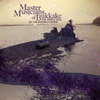 This particular musical collective hails from the PacificNorthwest, and has close ties to the Sun City Girls; both Alan Bishopand Charlie Gocher make guest appearances, and the album is released onSCG's own Abduction label. Like a lot of bands lazily being lumped inunder the heading of New Weird America, MMOB focus on freeimprovisation and play with the idea of a hippie drum circle, movingbetween areas of dissonance and chaos, to long passages of cohesiveensemble playing. The Visible Sign of the Invisible Ordercomes in 15 separate tracks that have been joined together into onelong, amorphous musical ritual. And the emphasis here is on ritual,with much of the music drawing from a Westerner's conception of Middleand Far Eastern ceremonial musical forms, from Moroccan joujouka toJapanese taiko, from the most hidden Sufi order to the most profane andobvious ethnological forgeries. Like much of SCG's best work, there isno distinction made between high and low art here, and a shamblingsense of joyous group improvisation negates any sense of that sleazycultural imperialism often found in the "World Music" section of yourlocal record store. MMOB achieves a righteous sense of psychedelic,ritualized improvisation that is dynamic, hypnotic and substantive, asif the musicians on Paradieswarts Duul had decided to channelthe entire Sublime Frequencies catalog into one hour-longimprovisation. Schuller and the collective (which includes thesuperlative Eyvind Kang on electric violin) attack a multitude ofinstruments, largely percussive in nature, with all players utilizingtheir voices in a nonverbal, intuitively Eastern way. Though I doubtany of the mantric recitations and chanting found on the recordrepresent anything other than meaningless glossolalia, the MMOB areincredibly good at building tension and drama with their meldingvoices, creating an invisible ritual chamber in which the music exists.Much of this music was recorded outdoors, with the coastal and interiorforest acoustics lending an ancient, timeless quality to the music.Scattered among the 15 tracks are several well-placed moments ofclimactic explosiveness, most notably on the slyly named "Access ofEvil," which reaches a hair-raising crescendo of ululations andmonolithic tribal percussion. "Pillow of Green Light" apparentlyattempts to recreate the Dogon tribe's creation myth, with aterrifyingly chaotic swirl of noise and electronics, the soundtrack ofa pre-Babylonian alien abduction deep in the heart of Africa. Therepetitive firing of a 9mm firearm on "Custody's Last Battle/SecretWars" evokes the slaughter of Native Americans, forging a secret jihad.The album ends with absolutely lovely "Circular and Made of the Earth,"which combines high-lonesome steel guitar (or is it sitar?) with femalevocals, floating on a rich backdrop of deep, reverberating aums andharmonic drones. My only complaint with this album is the botchedpackaging job, piss-poor four-color process having rendered the coverphoto and liner notes completely unintelligible. Musically, however,the MMOB have created a true masterpiece, one that entirely transcendsthe collective's unfortunate choice of name.
This particular musical collective hails from the PacificNorthwest, and has close ties to the Sun City Girls; both Alan Bishopand Charlie Gocher make guest appearances, and the album is released onSCG's own Abduction label. Like a lot of bands lazily being lumped inunder the heading of New Weird America, MMOB focus on freeimprovisation and play with the idea of a hippie drum circle, movingbetween areas of dissonance and chaos, to long passages of cohesiveensemble playing. The Visible Sign of the Invisible Ordercomes in 15 separate tracks that have been joined together into onelong, amorphous musical ritual. And the emphasis here is on ritual,with much of the music drawing from a Westerner's conception of Middleand Far Eastern ceremonial musical forms, from Moroccan joujouka toJapanese taiko, from the most hidden Sufi order to the most profane andobvious ethnological forgeries. Like much of SCG's best work, there isno distinction made between high and low art here, and a shamblingsense of joyous group improvisation negates any sense of that sleazycultural imperialism often found in the "World Music" section of yourlocal record store. MMOB achieves a righteous sense of psychedelic,ritualized improvisation that is dynamic, hypnotic and substantive, asif the musicians on Paradieswarts Duul had decided to channelthe entire Sublime Frequencies catalog into one hour-longimprovisation. Schuller and the collective (which includes thesuperlative Eyvind Kang on electric violin) attack a multitude ofinstruments, largely percussive in nature, with all players utilizingtheir voices in a nonverbal, intuitively Eastern way. Though I doubtany of the mantric recitations and chanting found on the recordrepresent anything other than meaningless glossolalia, the MMOB areincredibly good at building tension and drama with their meldingvoices, creating an invisible ritual chamber in which the music exists.Much of this music was recorded outdoors, with the coastal and interiorforest acoustics lending an ancient, timeless quality to the music.Scattered among the 15 tracks are several well-placed moments ofclimactic explosiveness, most notably on the slyly named "Access ofEvil," which reaches a hair-raising crescendo of ululations andmonolithic tribal percussion. "Pillow of Green Light" apparentlyattempts to recreate the Dogon tribe's creation myth, with aterrifyingly chaotic swirl of noise and electronics, the soundtrack ofa pre-Babylonian alien abduction deep in the heart of Africa. Therepetitive firing of a 9mm firearm on "Custody's Last Battle/SecretWars" evokes the slaughter of Native Americans, forging a secret jihad.The album ends with absolutely lovely "Circular and Made of the Earth,"which combines high-lonesome steel guitar (or is it sitar?) with femalevocals, floating on a rich backdrop of deep, reverberating aums andharmonic drones. My only complaint with this album is the botchedpackaging job, piss-poor four-color process having rendered the coverphoto and liner notes completely unintelligible. Musically, however,the MMOB have created a true masterpiece, one that entirely transcendsthe collective's unfortunate choice of name. Read More

